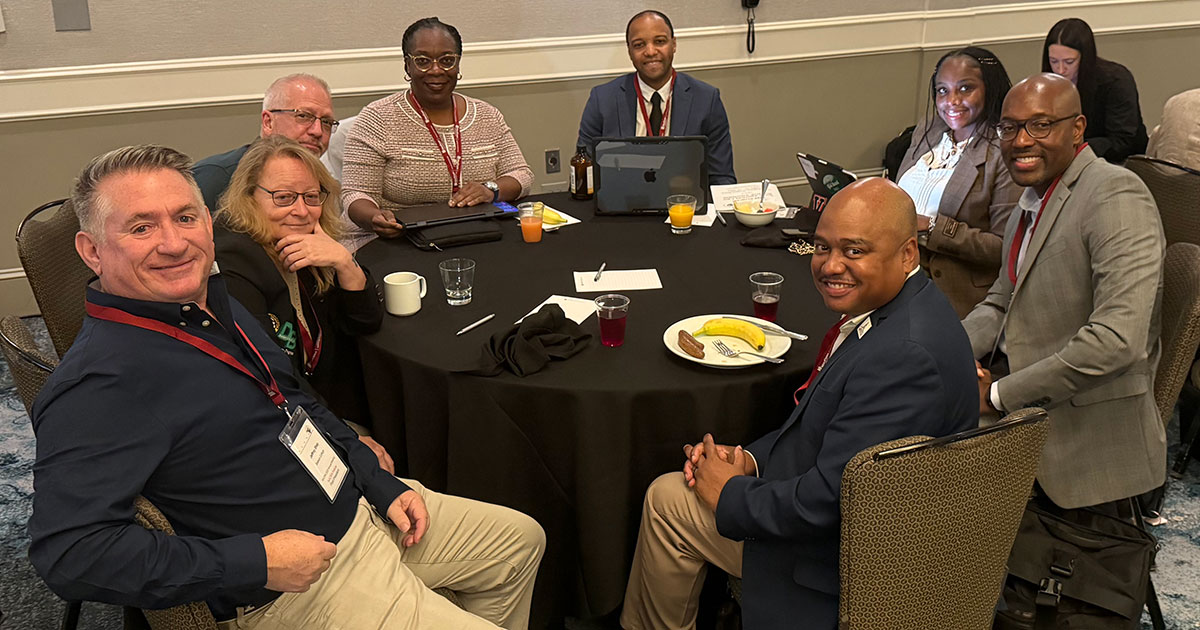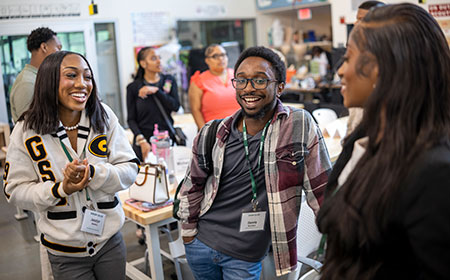Babson Works with HBCUs to Boost Entrepreneurship Education

What would you do?
That’s the question at the heart of a case study. A hallmark of a business education, including at Babson College, a case study puts students in the middle of a real-life company conundrum, forcing them to confront the facts and reason out how they would handle it.
“Cases are a form of experiential learning,” says D.R. Widder MBA’99, vice president of innovation at Babson. “A case lets you live the experience of the protagonist, the main character of the case. You stand in their shoes. You’re in their scenario.”
That makes for an effective teaching tool, particularly if students can identify with the central figures of the case and the challenges they face. “That makes it more relatable,” Widder says. “You see yourself.”
That critical relatability, though, can be hard to find sometimes. That’s because case studies often don’t feature protagonists from a variety of backgrounds. “Unfortunately, there is a paucity of cases with protagonists from underrepresented groups,” says Jeffrey Shay ’87, MBA’91, a Babson professor of entrepreneurship.
Babson is looking to change that. In a series of workshops, the College is helping professors from Historically Black Colleges and Universities (HBCUs) to write, publish, and teach case studies. The workshops harken to Babson’s belief in inclusive excellence, an understanding that entrepreneurial leaders hail from a wide array of circumstances, and that their disparate experiences bring a range of perspectives, ideas, and relationships to their work. “Inclusive excellence is core to Babson,” Widder says, “because an entrepreneurial leader is an inclusive leader and creates more value.”
The case-writing program is one of several initiatives that Babson is conducting with HBCUs, all in an effort to empower entrepreneurial leaders and the professors who educate them.
A Need for Entrepreneurship
Babson’s programs with HBCUs stem from its relationship with the National HBCU Business Deans Roundtable. Widder championed this relationship with the roundtable, which represents 55 HBCU business schools and which recently honored Babson with an award recognizing its innovative programming in entrepreneurship.

Tracy Dunn served as a past president of the organization and oversaw the implementation of several Babson initiatives before her term expired in June. “I am deeply grateful for these programs,” says Dunn, the dean of the Tyrone Adam Burroughs School of Business and Entrepreneurship at Benedict College in Columbia, South Carolina. “These collaborations have had a significant impact on our member institutions—opening doors, broadening perspectives, and laying the groundwork for long-term ecosystem development in HBCU business education.”
Besides the case-writing program, Babson has invited HBCU students to campus to participate in Babson Build, which teaches how to think and act entrepreneurially. In May, Babson held another program, the Price-Babson Symposium for Entrepreneurship Educators (SEE), at Clark Atlanta University that was attended by HBCU faculty. SEE instructs educators on how to better teach entrepreneurship.
HBCU deans also attended the Global Consortium of Entrepreneurship Centers conference when Babson hosted the gathering for university-based entrepreneurship programs last year.
Taken together, almost 100 faculty members and over 50 students representing 33 HBCUs participated in Babson programs in the 2024–2025 school year. This ongoing work with Babson is critical, Dunn believes, because entrepreneurship education enables students to become innovators and leaders capable of generating opportunities not only for themselves but also for their communities.
“As the global economy continues to evolve, it is increasingly important that we equip our students with more than just the tools to seek employment,” Dunn says. “We must empower them to create employment.”
A Community of Case Writers
For the case-writing program this year, Shay led four virtual workshops attended by 33 participants from 22 HBCUs. Over the course of those workshops, attendees were taken through the entire case-writing process, from identifying possible cases to writing them up to having them reviewed to teaching them in the classroom.
In all, 11 cases were developed during this year’s workshops, with eight of those presented at the October conference of the North American Case Research Association (NACRA), an organization committed to the writing and teaching of cases. Research scholars from NACRA served as mentors to the HBCU case authors, and Babson is collaborating with Harvard Business Publishing on potential distribution of the cases.
“These collaborations have had a significant impact on our member institutions—opening doors, broadening perspectives, and laying the groundwork for long-term ecosystem development in HBCU business education.”
Tracy Dunn, past president of the National HBCU Business Deans Roundtable
This is the second time that Babson has run its HBCU case-writing program, with a pilot of the initiative happening in 2023. The goal is that attendees will continue to develop cases in the future, in the process fostering inclusivity in business education and building a supportive community of case writers.
“Our hope is that these initial two cohorts become active case writers and publish their work,” Shay says, “as well as becoming case research ambassadors who will inspire and mentor additional HBCU case writers.”
This work with HBCUs, from case writing to SEE to Babson Build, is an illustration of the College’s strategic vision, Widder says. He came to Babson because he believes in the power of entrepreneurship, and the College’s strategy calls for educating entrepreneurial leaders everywhere.
“Our everywhere strategy is about reaching anyone anywhere with the entrepreneurial mindset,” he says. “That’s what motivates me.”




